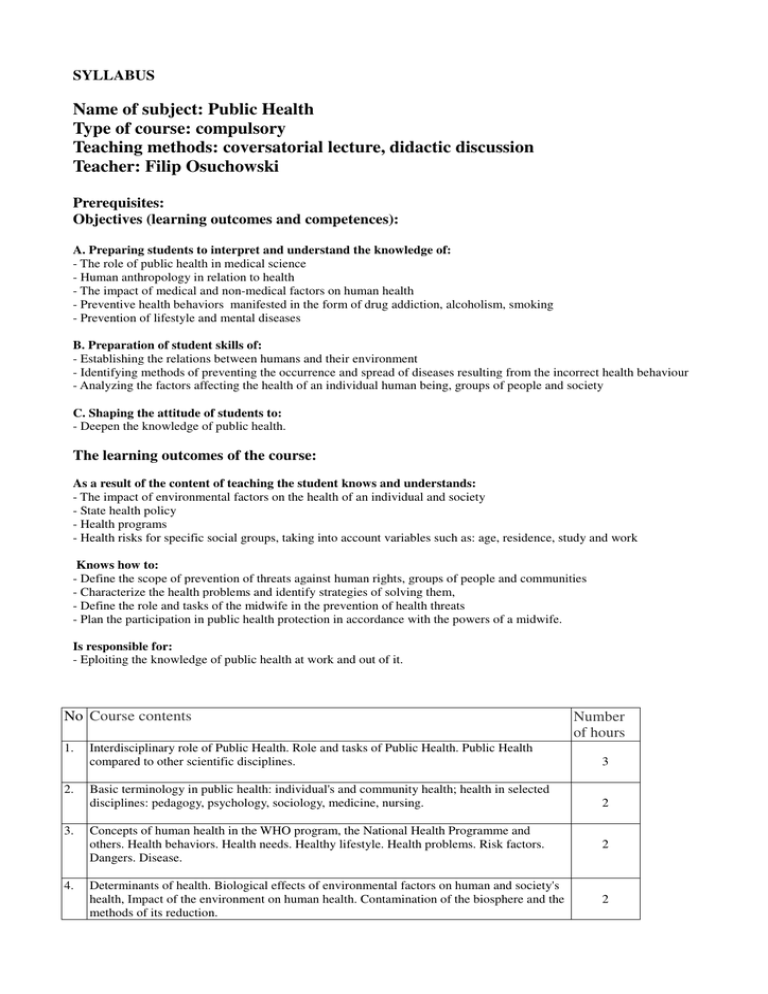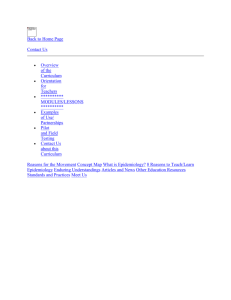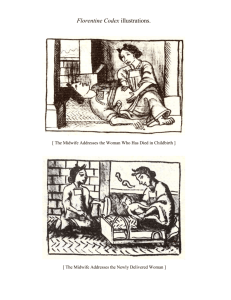Name of subject: Public Health Type of course: compulsory
advertisement

SYLLABUS Name of subject: Public Health Type of course: compulsory Teaching methods: coversatorial lecture, didactic discussion Teacher: Filip Osuchowski Prerequisites: Objectives (learning outcomes and competences): A. Preparing students to interpret and understand the knowledge of: - The role of public health in medical science - Human anthropology in relation to health - The impact of medical and non-medical factors on human health - Preventive health behaviors manifested in the form of drug addiction, alcoholism, smoking - Prevention of lifestyle and mental diseases B. Preparation of student skills of: - Establishing the relations between humans and their environment - Identifying methods of preventing the occurrence and spread of diseases resulting from the incorrect health behaviour - Analyzing the factors affecting the health of an individual human being, groups of people and society C. Shaping the attitude of students to: - Deepen the knowledge of public health. The learning outcomes of the course: As a result of the content of teaching the student knows and understands: - The impact of environmental factors on the health of an individual and society - State health policy - Health programs - Health risks for specific social groups, taking into account variables such as: age, residence, study and work Knows how to: - Define the scope of prevention of threats against human rights, groups of people and communities - Characterize the health problems and identify strategies of solving them, - Define the role and tasks of the midwife in the prevention of health threats - Plan the participation in public health protection in accordance with the powers of a midwife. Is responsible for: - Eploiting the knowledge of public health at work and out of it. No Course contents 1. 2. 3. 4. Number of hours Interdisciplinary role of Public Health. Role and tasks of Public Health. Public Health compared to other scientific disciplines. 3 Basic terminology in public health: individual's and community health; health in selected disciplines: pedagogy, psychology, sociology, medicine, nursing. 2 Concepts of human health in the WHO program, the National Health Programme and others. Health behaviors. Health needs. Healthy lifestyle. Health problems. Risk factors. Dangers. Disease. 2 Determinants of health. Biological effects of environmental factors on human and society's health, Impact of the environment on human health. Contamination of the biosphere and the methods of its reduction. 2 5. State health policy. Problems and strategies for health. Health programs. National Health Programme. 4 6. Programme actions for health on regional, over-regional and international scale. 4 7. Disease-prevention - goals, tasks, forms. 3 REFERENCES 1. Wallace RB. Maxcy-Rosenau-Last Public Health & Preventive Medicine, 15th Ed. New York: McGraw-Hill, 2008. 2. Fee and Acheson, A History of education in public health: Health that mocks the doctors' rules, OUP, 1991. (ISBN 0192617575 ) 3. White, K. L. (1991). Healing the schism: Epidemiology, medicine, and the public's health. New York: Springer-Verlag. 4. Breslow, Lester, ed (2002). Encyclopedia of Public Health. New York: Macmillan Reference USA. ISBN 9780028653549 5. HSDB Hazardous Substances Data Bank The database contains over 5,000 data profiles on potentially toxic chemical substances. It is updated by specialists at the US National Library of Medicine and is peer reviewed by the Scientific Review Panel. 6. ESIS Euopean chemical substances information system. Or search through eChemPortal. 7. ILO Encyclo Encyclopaedia of Occupational Health and Safety, 4th ed., Stellman JM, ed. (ILO, 1998) 8. NCID CDC National Center for Infectious Diseases. 9. Adami HO, Hunter D, Trichopoulos D (eds). Textbook of Cancer Epidemiology. New York: Oxford University Press, 2002. 10. CCDM Heymann DL (ed). Control of Communicable Diseases Manual, 19th Ed. Washington DC: APHA, 2008. 11. ID Gorbach SL, Walker DH, Weller PF (eds). Infectious Diseases, 3rd Ed. Philadelphia: Lipincott Williams & Wilkins, 2004. 12. Schottenfeld D, Fraumeni JF (eds). Cancer Epidemiology and Prevention, 3rd Ed. New York: Oxford University Press, 2006.



